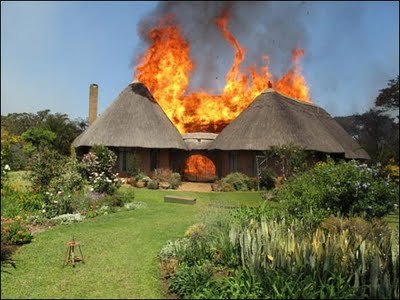Facing down a tyrant, Mugabe and the White African by Ben Freeth

Review by Philip Barclay
Facing down a tyrant,
Mugabe and the White African
by Ben Freeth
I have two abiding memories of Ben Freeth, the author of Mugabe and the White African. Soon after I arrived in Harare as a British diplomat in 2006, he invited me to his home on Mount Carmel farm in Chegutu. He showed me his crops – mangoes the size of rugby balls, vibrantly coloured citrus fruit, maize Ben Freeth home on fire
that towered above my head – and explained that a skilled farmer could grow anything in Zimbabwe’s rich and well-watered soils. He took me back to the wonderful farm house that he had built with his wife, Laura. A committed environmentalist, Freeth used the natural materials he found about him for the construction of his “five-star mud hut”. Many impressions of a deeply admirable man remain from that day: Freeth’s deep commitment to the land and to Africa, the courage of his family in the face of constant harassment and the strength of his religious faith.
My second memory is of a meeting in Mana Pools National Park. I was sitting in the camp when I saw a tall, rangy figure approaching across open country, skirting around a furious conflict between a herd of buffaloes and a pride of lions. It was Freeth, calm amid the bloodletting – the quintessence of the white African bushman. He is perhaps a man out of time – I can imagine him encountering Dr Livingstone two centuries ago.
Freeth’s book, which shares the name of a documentary film made about his family, is a personal account of a terrible decade spent working in Zimbabwean agriculture. During the most intense phase of Mugabe’s farm invasions in 2000-2002, Freeth worked for the Farmers’ Union, doing what he could to protect his members – several of whom were killed in their homes. Freeth became disillusioned with the compromises that some were ready to make with Mugabe and charted his own independent and uncompromising course. He became convinced that agriculture can only prosper if farmers have full ownership of t
Pursuing this strategy, Freeth instigated international legal action against Mugabe’s attempts to seize the land he farmed, which belonged to his father-in-law, Mike Campbell. Mugabe’s denunciation of white farmers as leftovers from colonial days could not reasonably be applied to Campbell, who had bought his land with Mugabe’s permission after independence – strong evidence for Freeth’s contention that the land seizures were motivated by racism, not a desire for post-colonial justice. Freeth won a series of legal victories over Mugabe’s lawyers in 2007 and 2008, but paid an immense price for doing so. In July 2008, he and his parents-in-law were abducted and brutally beaten. Soon afterwards, Freeth’s delightful house was burned down and his productive farm was trashed. Mike Campbell, tragically, died earlier this year having never recovered from his injuries.
Mugabe and the White African is compelling reading. Some of it is taken up with agricultural and legal technicalities, but Freeth’s story of his desire for justice in the face of morale-sapping violence pulls the reader through. His decency and righteous anger at what he and the country he loves have suffered radiates out from his words, and he writes as he talks – directly and plainly. This clarity gives Freeth’s description of the protracted torture he suffered a horrifying power. One can only admire the strength and faith which have equipped him to carry on after enduring so much.
A firm believer in literal biblical authority, Freeth contrasts the anarchic condition of Zimbabwe with “the law that was given by God”. He infuriated senior associates of Mugabe by reading from Deuteronomy at a Farmers’ Congress, “Praise the Lord your God for the land he has given you”. He believes that Africa’s predicament results partly from the “evil spiritual forces” of witch doctors and mediums. He is open about the visions and signs which guide his family at moments of crisis and sees significance in the adoption by Mugabe’s allies of reptilian noms de guerre, recalling from Isaiah that “the Lord will punish … Leviathan the gliding serpent”.
Parts of the book are uncomfortable for a Western liberal to read. Freeth appears to be sceptical that black Africans can run their own enterprises and societies on just lines, despite the fact that Zimbabwe’s neighbours – Botswana, Malawi, Mozambique, Zambia – are democratic, peaceful and recovering well from the traumas of independence.
Freeth’s understandable focus on the plight of white farmers obscures somewhat the fate of a million black farmer workers who have lost their livelihoods – and often their lives – after being evicted from their homes by Mugabe’s cohorts. I know that Freeth cares deeply about the fate of his former workers, so it would have given his book more balance if he could have recorded that more fully. It is also a pity that Freeth does not tell us about his childhood. He appears at the start of the book as a young man discovering Africa. I wanted to know why he adopted the continent.
Mugabe and the White African is essential reading for anyone interested in Zimbabwe’s sad and continuing plight or in the extraordinary bravery of a family’s defiance of violence and injustice.


 Votes : 0
Votes : 0









